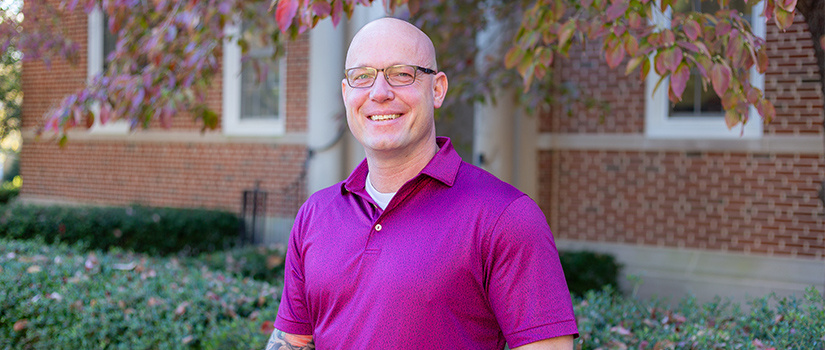When Ian Adams talks about policing and artificial intelligence, he’s speaking from experience—first in the field, and now in the digital realm. After more than a decade as a police officer and another six years in administration, Adams became a professor and researcher, bringing with him a deep understanding of the challenges faced by law enforcement.
As an assistant professor in the Department of Criminology and Criminal Justice at the University of South Carolina, he’s examining how AI can be applied in areas like body-worn cameras and report writing. His work asks: “Does this technology actually solve a problem?”
“When innovative technology like body-worn cameras starts getting adopted, a ton of energy gets poured into making predictions about the effects of the technology,” Adams says. “In these cases, the predictions are based on somewhat flawed understandings of the context that officers operate within. I love being able to experimentally test these predictions.”
Adams has tested some early theories with the Richland County Sheriff’s Department, questioning assumptions that using technology to review body camera footage will improve officers’ professionalism. Another experiment with the Manchester Police Department in New Hampshire questioned whether AI would save time over handwriting reports.
In this Q&A, Adams shares results from his research and insights on the future of AI in policing.
Q: What was the inspiration behind your research on AI in policing, particularly with body cameras and report writing?
A: I’m a technology optimist and have long been a hobbyist in the AI space. When the ChatGPT public tool launched, I intuited that officers would likely use this tool on their own to improve writing reports, a task that tends to take up a lot of time. The marketing around these tools was making huge, overly precise claims about the efficiencies they would bring, but these claims were made without any underlying evidence. Large, precise claims without evidence are an excellent place to situate an experiment.
Q: What key findings have emerged from your recent study on AI's role in analyzing police body camera footage? What do you hope people take away from this research?
A: We evaluated nearly 200,000 body-camera videos. We found that we can improve professionalism in officer interactions by giving them timely feedback. We demonstrated that even where there is not a great deal of unprofessionalism detected (as in Richland), we can nearly double the rate of highly professional encounters. We think this technology can raise both the floor and ceiling of officer professionalism. That said, these are preliminary findings and have not been peer-reviewed.
Q: You recently published a paper on AI-assisted report writing recently in Journal of Experimental Criminology. What were your findings from that research?
A: Put simply, AI-assisted report writing did not improve report writing time. The police report is a critical linchpin in the entire criminal justice system, and so we should intentionally seek out careful experimental evidence rather than charge headlong into the unknown future.
Q: What role do you think policymakers should play in regulating the use of AI in policing?
A: We need dramatically more support for examining how technology gets used in the real world, as well as asking the question: does this accomplish the concrete goals we had when we adopted the technology? I’m a voice for patience. I ask policy makers to be supportive of the efforts to develop a body of evidence, and then be willing to fold that evidence into their decisions on policy.
Q: Your work was recently featured on NPR's Morning Edition and the Click Here podcast. What has the public response been like to your research?
A: I’ve been really amazed at the interest shown by the public in this work. We’ve benefited from a broader interest in artificial intelligence overall. Having the opportunity to provide the earliest evidence in this space has been a joy, and I think sometimes when you are producing evidence that runs counter to “folk wisdom” then people pay a bit more attention.
There’s also been tremendous interest from police agencies and officers themselves. Policing has a history of early and robust adoption of technology, and I think a lot of people underestimate both the sophistication that agencies bring to how they think about technology, as well as how hungry they are to know about “what works.”
Q: How do you envision the evolution of AI in law enforcement in the next 5-10 years? What role do you see yourself playing in that future?
A: AI will shift policing in enormous ways that we probably don’t see coming at all. With any luck, I’ll be able to tag along and indulge my endless curiosity about how this incredibly important institution we call policing continues to develop over the next 30 years.
